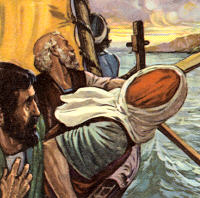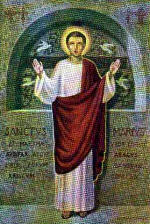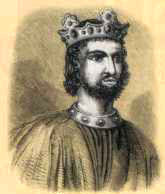Jan 19, Night Prayer for Thursday of the 2nd week of Ordinary Time
Ribbon Placement:
Liturgy of the Hours:
Vol I, page 1183
Vol II, Page 1642
Vol III, Page 1283
Vol IV, Page 1247
Christian Prayer:
Page 1049
General instruction:
Please pray with us actively, especially by joining with us in saying antiphons and responses, most of which are indicated in this highlight.
Consider an examination of your own conscience before beginning to best make use of our time together in prayer.
Night Prayer for Thursday
God, come to my assistance.
– Lord, make haste to help me.
Glory to the Father, and to the Son, and to the Holy Spirit:
– as it was in the beginning, is now, and will be for ever. Amen. Alleluia.
Examination of conscience:
We are called to have a clear conscience toward God and toward men, in our hearts and in our minds, in our actions and inactions. To do so, it is vital that we examine our conscience daily and to ask for God’s mercy as we fall short and to ask for His strength to do better.
Lord Jesus raise us to new life:
Lord, have mercy
– Lord have mercy
Lord Jesus, you forgive us our sins:
Christ, have mercy.
– Christ, have mercy.
Lord Jesus you feed us with your body and blood:
Lord, have mercy
– Lord have mercy
HYMN
O Lord my God! when I in awesome wonder
Consider all the worlds Thy hands have made,
I see the stars, I hear the mighty thunder,
Thy power throughout the universe displayed:
Then sings my soul, my Savior God, to Thee:
How great Thou art, how great Thou art!
Then sings my soul! my Savior God, to Thee:
How great Thou art, how great Thou art!
When through the woods and forest glades I wander
And hear the birds sing sweetly in the trees;
When I look down from lofty mountain grandeur
And hear the brook and feel the gentle breeze:
Then sings my soul, my Savior God, to Thee:
How great Thou art, how great Thou art!
Then sings my soul! my Savior God, to Thee:
How great Thou art, how great Thou art!
”How Great Thou Art” by Melinda Kirigin-Voss; Originally this was a Swedish folk melody, “O Store Gud” by Carl Boberg (1859-1940) and was translated by Stuart K. Hine in 1899.
”How Great Thou Art” by Melinda Kirigin-Voss is available from Amazon.com.
PSALMODY
Ant. 1 In you, my God, my body will rest in hope.
Psalm 16
God is my portion, my inheritance
The Father raised up Jesus from the dead and broke the bonds of death (Acts 2:24).
Preserve me, God, I take refuge in you.
I say to the Lord: “You are my God.
My happiness lies in you alone.”
He has put into my heart a marvelous love
for the faithful ones who dwell in his land.
Those who choose other gods increase their sorrows.
Never will I offer their offerings of blood.
Never will I take their name upon my lips.
O Lord, it is you who are my portion and cup;
it is you yourself who are my prize.
The lot marked out for me is my delight:
welcome indeed the heritage that falls to me!
I will bless the Lord who gives me counsel,
who even at night directs my heart.
I keep the Lord ever in my sight:
since he is at my right hand, I shall stand firm.
And so my heart rejoices, my soul is glad;
even my body shall rest in safety.
For you will not leave my soul among the dead,
nor let your beloved know decay.
You will show me the path of life,
the fullness of joy in your presence,
at your right hand happiness for ever.
Glory to the Father, and to the Son,
and to the Holy Spirit:
as it was in the beginning, is now,
and will be for ever. Amen.
Ant. In you, my God, my body will rest in hope.
READING 1 Thessalonians 5:23
May the God of peace make you perfect in holiness. May he preserve you whole and entire, spirit, soul, and body, irreproachable at the coming of our Lord Jesus Christ.
RESPONSORY
Into your hands, Lord, I commend my spirit.
– Into your hands, Lord, I commend my spirit.
You have redeemed us, Lord God of truth.
– I commend my spirit.
Glory to the Father, and to the Son, and to the Holy Spirit,
– Into your hands, Lord, I commend my spirit.
Gospel Canticle
Ant. Protect us, Lord, as we stay awake; watch over us as we sleep, that awake, we may keep watch with Christ, and asleep, rest in his peace.
Luke 2:29-32
Christ is the light of the nations and the glory of Israel
Lord, now you let your servant go in peace;
your word has been fulfilled:
my own eyes have seen the salvation
which you have prepared in the sight of every people:
a light to reveal you to the nations
and the glory of your people Israel.
Glory to the Father, and to the Son,
and to the Holy Spirit:
as it was in the beginning, is now,
and will be for ever. Amen.
Ant. Protect us, Lord, as we stay awake; watch over us as we sleep, that awake, we may keep watch with Christ, and asleep, rest in his peace.
Concluding Prayer
Lord God,
send peaceful sleep
to refresh our tired bodies.
May your help always renew us
and keep us strong in your service.
We ask this through Christ our Lord.
– Amen.
Blessing
May the all-powerful Lord grant us a restful night and a peaceful death.
– Amen.
Antiphon or song in honor of the Blessed Virgin Mary
9. And he spoke to his disciples, that a small ship should wait on him, because of the multitude, lest they should throng him.
10. For he had healed many; insomuch that they pressed upon him for to touch him, as many as had plagues.
11. And unclean spirits, when they saw him, fell down before him, and cried, saying, You ard the Son of God.
12. And he straitly charged them that they should not make him known.
THEOPHYL. At the same time again, he goes away, that by quitting the ungrateful he might do good to more, for many followed him, and he healed them. For there follows, And great multitude from Galilee, &c. Syrians and Sidonians, being foreigners, receive benefit from Christ; but His kindred the Jews persecute Him: thus there is no profit in relationship, if there be not a similarity in goodness.
BEDE; For the strangers followed Him, because they saw the works of His powers, and in order to hear the words of His teaching. But the Jews, induced solely by their opinion of His powers, in a vast multitude come to hear Him, and to beg for His aiding health; wherefore there follows, And he spoke to his disciples, that they should wait, &c.
THEOPHYL. Consider then how he hid His glory, for he begs for a little ship, lest the crowd should hurt Him, so that entering into it, he might remain unharmed. it follows, As many as had scourges, &c. But he means by scourges, diseases, for God scourges us, as a father does His children.
BEDE; Both therefore fell down before the Lord, those who had the plagues of bodily diseases, and those who were vexed by unclean spirits. The sick did this simply with the intention of obtaining health, but the demoniacs, or rather the devils within them, because under the mastery of a fear of God they were compelled not only to fall down before Him, but also to praise His majesty; wherefore it goes on, And they cried out, saying, You are the Son of God. And here we must wonder at the blindness of the Arians, who, after the glory of His resurrection, deny the Son of God, Whom the devils confess to be the Son of God, though still clothed with human flesh.
There follows, And he straitly charged them, that they should not make him known. For God said to the sinner, Why do you preach my laws? A sinner is forbidden to preach the Lord, lest any one listening to his preaching should follow him in his error, for the devil is an evil master, who always mingles false things with true, that the semblance of truth may cover the witness of fraud. But not only devils, but persons healed by Christ, and even Apostles, are ordered to be silent concerning Him before the Passion, lest by the preaching of the majesty of His Divinity, the economy of His Passion should be retarded. But allegorically, in the Lord's coming out of the synagogue, and them retiring to the sea, The prefigured the salvation of the Gentiles, to whom The deigned to come through their faith, having quitted the Jews on account of their perfidy. For the nations, driven about in divers by-paths of error, are fitly compared to the unstable sea.
Again, a great crowd from various provinces followed Him, because He has received with kindness many nations, who came to Him through the preaching of the Apostles. But the ship waiting upon the Lord in the sea is the Church, collected from amongst the nations; and He goes into it lest the crowd should throng Him, because flying from the troubled minds of carnal persons, The delights to come to those who despise the glory of this world, and to dwell within them. Further, there is a difference between thronging the Lord, and touching Him; for they throng Him, when by carnal thoughts and deeds they trouble peace, in which truth dwells; but he touches Him, who by faith and love has received Him into his heart; wherefore those who touched Him are said to have been saved.
THEOPHYL. Morally again, the Herodians, that is, persons who love the lusts of the flesh, wish to slay Christ. For the meaning of Herod is, 'of skin.' But those who quit their country, that is, a carnal mode of living, follow Christ, and their plagues are healed, that is, the sins which wound their conscience. But Jesus in us is our reason, which commands that our vessel, that is, our body, should serve Him, lest the troubles of worldly affairs should press upon our reason.
Catena Aurea Mark 3



 Their feast does not appear in the Roman calendar until the twelfth century. The Acts of these martyrs are wholly legendary. They give the following details. Marius was a Persian of noble extraction. With his wife, who was also noble-born, and his two sons, Audifax and Abachus, he came to Rome during the reign of Emperor Claudius II (268-270) to venerate the graves of the martyrs. They visited the Christians in prison, encouraged them by word and deed, and shared with them their goods. And like Tobias of old, they buried the bodies of the saints.
Their feast does not appear in the Roman calendar until the twelfth century. The Acts of these martyrs are wholly legendary. They give the following details. Marius was a Persian of noble extraction. With his wife, who was also noble-born, and his two sons, Audifax and Abachus, he came to Rome during the reign of Emperor Claudius II (268-270) to venerate the graves of the martyrs. They visited the Christians in prison, encouraged them by word and deed, and shared with them their goods. And like Tobias of old, they buried the bodies of the saints.  St. Canute, king of Denmark, was murdered in St. Alban's Church, Odense, July 10, 1086. The Martyrology confuses him with his nephew, St. Canute the Duke, who died on January 7, 1131, and was canonized November 8, 1169, by Pope Alexander III. St. Canute is also called Canute the holy, or Danish Knut, or Knud, Den Hellige, or Sankt Knut, or Knud.
St. Canute, king of Denmark, was murdered in St. Alban's Church, Odense, July 10, 1086. The Martyrology confuses him with his nephew, St. Canute the Duke, who died on January 7, 1131, and was canonized November 8, 1169, by Pope Alexander III. St. Canute is also called Canute the holy, or Danish Knut, or Knud, Den Hellige, or Sankt Knut, or Knud. 

